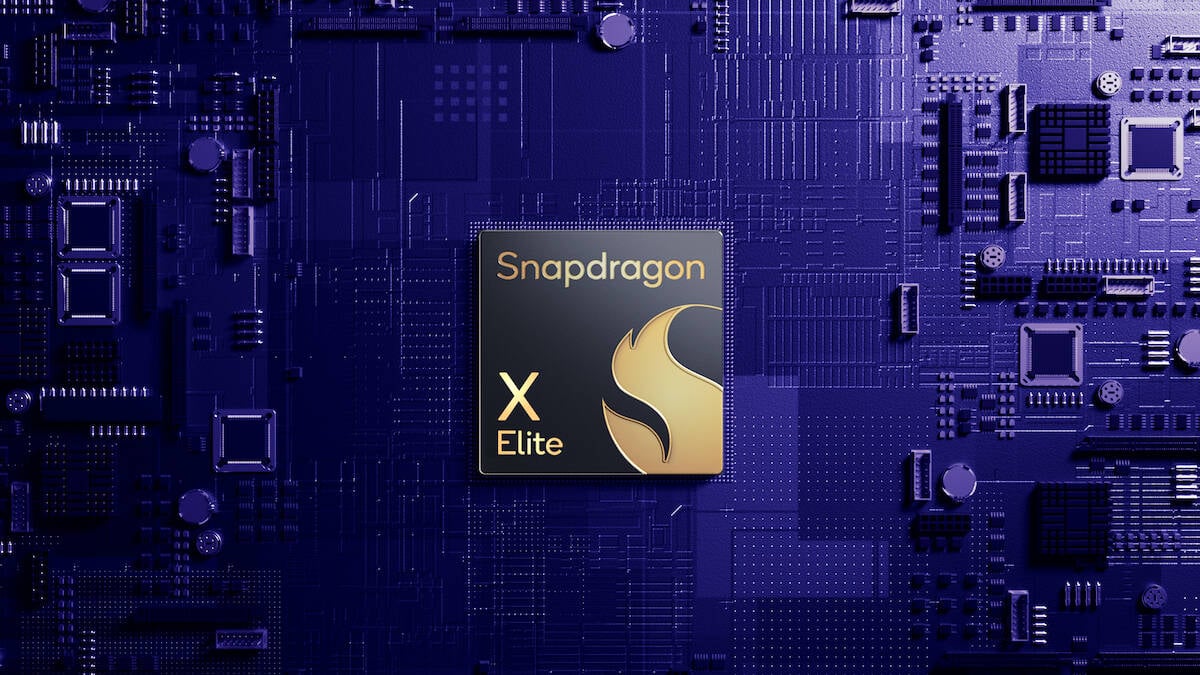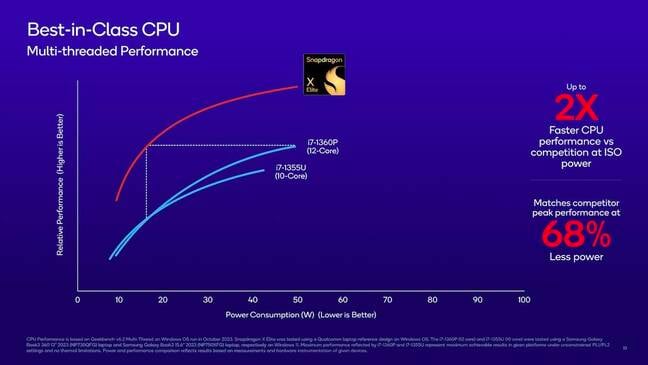Qualcomm's Claims Its X Elite PC Parts Can Go Toe-to-toe With Apple, Intel

Qualcomm is claiming its latest PC processors are ready to go toe-to-toe with Intel, AMD, and Apple on performance and efficiency.
At the opening keynote its Snapdragon Summit on Tuesday, the San Diego-based chipmaker revealed the Snapdragon X Elite, which it claims is its most powerful system on chip (SoC) to date.
Much like Apple's M-series processors, the X Elite is aimed at notebook and tablet form factors to woo OEMs. The chip is built on a 4nm process node and features a dozen of Qualcomm's custom Oryon CPU cores clocked at 3.8GHz and supported by 42MB of total cache. Unlike many SoC designs, it ditches efficiency cores in favor of a boost capability, which allows up to two of the cores to hit 4.3GHz.
These cores are Qualcomm's first developed by its Nuvia team, which it acquired for $1.4 billion in 2021. Qualcomm first teased its Oryon cores at last year's Snapdragon Summit.
The CPU is complemented by Qualcomm's Adreno GPU, which it claims is good for 4.6 teraFLOPS of FP32 performance — more on how the chip stacks up to the competition in a minute. The GPU can support up to two 5K or three 4K monitors at 60Hz.
The CPU and GPU are fed up to 64GB of LPDDR5x 8,533MT/s memory, though memory bandwidth is capped at 136GB/s. For reference, that's about 36 percent more than Apple's M2, but slower than the M2 Pro's 200GB/s.
Alongside the CPU and GPU, the X Elite features Qualcomm's Hexagon neural processing unit (NPU) which is good for 45 TOPS. According to Qualcomm, these features allow the chip to run AI models up to 13 billion parameter models entirely on device, and generate 30 tokens a second when running smaller 7B parameter large language models. We'll note that these claims appear to rely heavily on Qualcomm's own AI models developed to run on mobile devices.
As we mentioned earlier, this chip is designed to power a variety of PC and tablet hardware and thus features a configurable thermal design power (TDP) of up to 50 watts.
How the X-Elite stacks up
Qualcomm is making some big claims when it comes to the performance of its X Elite chips.
In a rather nebulous series of charts — note the Y-axis which simply states "relative performance" — the company claims up to 2x higher multithreaded performance compared to the "leading" 10-core and 12-core laptop chips, or 1/3 the power consumption for the same performance in Geekbench 6.2.

Qualcomm's X Elite chips claim to deliver twice the performance of Intel's 10-core i7-1355U - Click to enlarge
What are these 10 and 12 core processors? Well, they're not Apple's M2 Pro or Max chips. Instead, Qualcomm's performance claims are leveled squarely against Intel's 10-core Raptor Lake 1355U and 12-core 1360P processors. For reference those are 15 and 28 watt parts capable of boosting up to 55 and 64 watts respectively, depending on configuration, power, and thermals.
Pitted against Intel's more powerful 14-core i7-13800H mobile chip, Qualcomm says the X Elite will deliver up to 60 percent higher performance or the same performance using 65 percent less power.
CPU performance doesn't tell the whole story. The X Elite is packing an Adreno GPU that Qualcomm boasts is 2x faster as the integrated graphics in Intel's Core i7 13800H and up to 80 percent faster than the Radeon 780M graphics found in AMD's Ryzen 9 7940HS, at least in the 3DMark Wildlife Extreme benchmark.
While Qualcomm was happy to pit its latest PC chip against Intel and AMD's current crop of mobile processors, the biz was far quieter when it came to Apple Silicon. The only performance comparison Qualcomm gave was for multi-threaded performance in Geekbench compared to Apple's M2 SoC, in which it claimed the X Elite is 50 percent faster. In the fine print we see the comparison used an 13-inch MacBook Pro, so Qualcomm gets some points for not choking its competitors chip in a passively cooled chassis.
Digging through Geekbench Browser we see the M2 pulls off a multicore score of 9876, implying the X Elite should be able to manage a score of 14,814. If true, that would put the chip on par with Apple's more powerful M2 Pro. We suspect "50 percent faster peak multithreaded performance vs. M2," sounded better to Qualcomm's marketing team than a performance on par with Apple's soon to be last-gen parts.
As with all vendor-supplied benchmarks, we recommend you take Qualcomm's with a healthy dose of salt. This is especially true when it comes to GPU benchmarks, where factors like driver support can have a big impact on performance. At least on that front, Qualcomm says the GPUs drivers will be user upgradable this time around.
As SemiAnalysis chief analyst Dylan Patel previously told The Register, Qualcomm's driver support in Windows has been lacking in the past.
It's going to be a while before we can test whether Qualcomm's upgradable drivers do anything to address this criticism, let alone see how the chip stacks up in the real world. Qualcomm expects the X Elite to start making its way into partner devices sometime in mid-2024.
- Intel stock stumbles on report Nvidia is building an Arm CPU for PC market
- AMD gives 7000-series Threadrippers a frequency bump with Epyc core counts
- Intel's 14th-gen Raptor Lake Refresh turns turbos up to 6GHz, gives i7 an E-core bump
- Nvidia's accelerated cadence spells trouble for AMD and Intel's AI aspirations
AI PC? What about an AI Smartphone
Along with Qualcomm's upcoming X Elite processor, the chipmaker also showed off its third-gen Snapdragon 8 SoC, which in addition to higher performance has been optimized for running large language models like Meta's Llama 2 on device.
The 4nm chip features a new core arrangement with two efficiency cores clocked at 2.3GHz, five performance cores topping out at 3.2GHz, and a single "Prime" core capable of hitting 3.3 GHz. Compared to last generation, Qualcomm says the CPU is 30 percent faster and 20 percent more efficient
The chip's Adreno GPU and Hexagon NPU have also received upgrades this time around. In addition to supporting 1Hz variable refresh rate displays, Qualcomm says the GPU is 25 percent faster and 25 percent more efficient than its predecessor. Meanwhile, the chipmaker says its NPU is nearly twice as fast and 40 percent more efficient.
That latter part is notable as the chip biz is leaning heavily on the NPU to power a slew of new AI features. According to https://www.telegraph.co.uk/music/artists/best-and-worst-of-david-duchovny-interview/the chip can support large language models with 10 billion parameters or more and generate up to 15 tokens a second.
In a pre-briefing ahead of today's announcement, Qualcomm execs demoed the chip generating images using Stable Diffusing or running a chatbot like Meta's Llama 2 entirely on device. But before you get too excited, these models have been specifically optimized to run at lower precision in order to get them working on a smartphone processor.
At launch Qualcomm has 20 models available for partners to integrate into applications and software features.
The idea of running AI models on devices has taken off in recent months, with Intel talking touting the beginning of the AI generation at its Innovation event in San Jose last month. The company is also leaning heavily on NPUs to make this possible. Its first NPU-equipped notebook chip is due out in December.
And there's also Apple, which on Tuesday, around the time of Qualcomm's keynote, sent out invitations for an October 30 event and hinting at a "scary fast" piece of kit in the pipeline. The Register will be keeping a beady eye on proceedings. ®
From Chip War To Cloud War: The Next Frontier In Global Tech Competition
The global chip war, characterized by intense competition among nations and corporations for supremacy in semiconductor ... Read more
The High Stakes Of Tech Regulation: Security Risks And Market Dynamics
The influence of tech giants in the global economy continues to grow, raising crucial questions about how to balance sec... Read more
The Tyranny Of Instagram Interiors: Why It's Time To Break Free From Algorithm-Driven Aesthetics
Instagram has become a dominant force in shaping interior design trends, offering a seemingly endless stream of inspirat... Read more
The Data Crunch In AI: Strategies For Sustainability
Exploring solutions to the imminent exhaustion of internet data for AI training.As the artificial intelligence (AI) indu... Read more
Google Abandons Four-Year Effort To Remove Cookies From Chrome Browser
After four years of dedicated effort, Google has decided to abandon its plan to remove third-party cookies from its Chro... Read more
LinkedIn Embraces AI And Gamification To Drive User Engagement And Revenue
In an effort to tackle slowing revenue growth and enhance user engagement, LinkedIn is turning to artificial intelligenc... Read more

